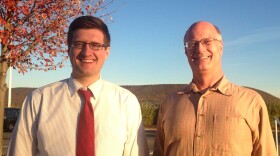Every time Pennsylvania voters are asked to make their picks in a race for the Supreme Court, they have to indulge in a polite fiction – one that party leaders and candidates both seem to dislike.
The candidates for justice have a party next to their names, but they must disavow party politics if they make it to the bench. Voters just have to pretend there’s no contradiction.
At a recent forum, three candidates for Supreme Court described how they navigate that process.
“Justice serves all, and it’s not along party lines,” said Commonwealth Court Judge Anne Covey, a Republican.
“I don’t ever approach a case a Democrat,” said Superior Court, Judge David Wecht, a Democrat. “I don’t believe there is a Democratic approach to a case.”
“The minute that you’re sworn in as a judge, your partisan politics are gone,” said another Democrat, Superior Court Judge Christine Donohue.
The state’s judicial system is not entirely partisan. Candidates for the lower courts can put their name on both party ballots – it’s called cross-filing. But in Pennsylvania, candidates for appellate court judge can’t cross-file. They have to choose a party.
Democrat and Philadelphia Common Pleas Judge Kevin Dougherty is another one of the seven judges running for the state’s highest court.
“In our run for the Common Pleas Court, we were permitted to run as both parties,” said Dougherty. “However, we had to choose a party for this state run.”
So the election is a weird interlude for candidates, when they hitch their wagons to political parties for months, only to ditch the party if they are successful.
That’s what makes appellate court races such a drag for the party leaders. Rob Gleason chairs the Pennsylvania Republicans. He can work all he wants to get Republicans on the Supreme Court, but he can’t call on them for help once they’re elected.
“They’re not going to be a foot soldier,” said Gleason. “I can ask a congressman to do a fundraiser for the Republican party of Pennsylvania, and he’ll do it. I cannot ask the chief justice to do one for us, because you’re not able to.”
“It’s a difficult process all around,” said Marcel Groen, state party chairman for Democrats.
The partisan set-up does not appear to be popular among the candidates, either.
“It’s a litmus test for a lot of voters,” said Adams County Common Pleas Judge Mike George, running as a Republican for Supreme Court. “And that is unfortunate. It affects endorsements. Unfortunately for me, it also affects money in the campaign.”
There has been a record-breaking amount of cash in the race for Supreme Court right now. Three of the bench’s seven seats are up for grabs, so the election will decide party control.
That’s important if you think partisan politics does influence the high court’s rulings. Close court observers say that it doesn’t usually make a difference. But the court can pick the tie-breaking member of a redistricting panel that draws new district boundaries for state lawmakers. That is something parties deem to be well worth fighting for.
The latest totals showed more than $11 million have been spent this year on the race – more than half of that going toward television ads. Six of the seven candidates have hit the airwaves.
“This is the system we have, so we have to work within the system that we have,” said Superior Court Judge Judy Olson, running as a Republican for Supreme Court.
One judge is trying to skirt the parties this time around: Philadelphia Common Pleas Judge Paul Panepinto. He’s running as an independent, after he failed to get the Republican nomination in May.
“I’ve been a Republican all my life,” said Panepinto this month. “But something hit me. You gotta deal with the politicians.”
After the election, the successful candidates will insist that they are no longer politicians -- even if they played one on TV.







